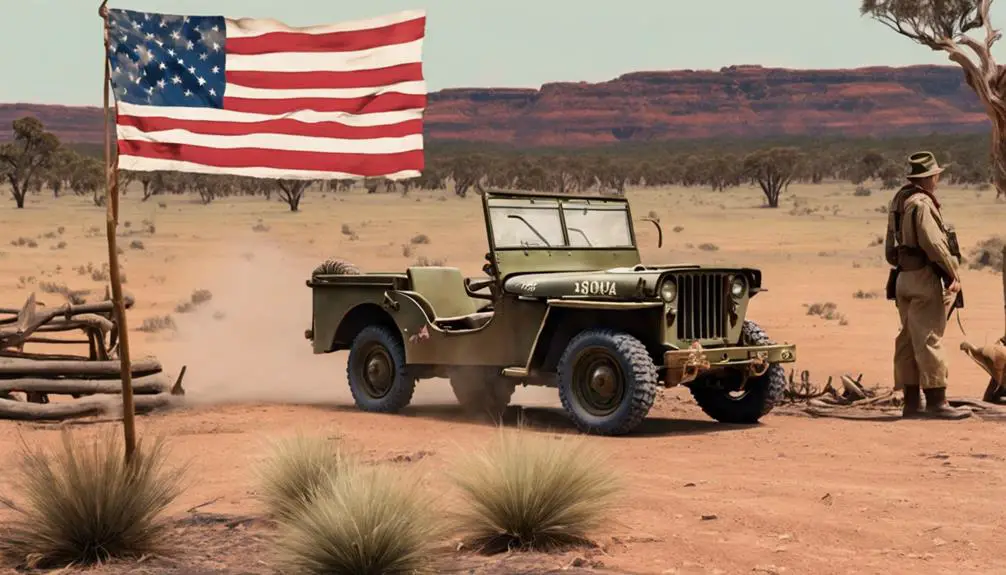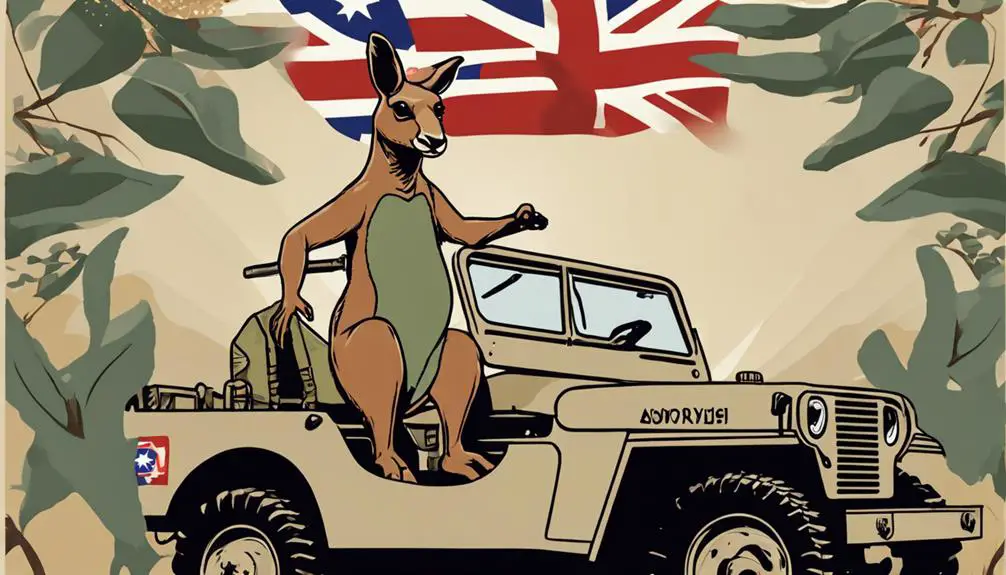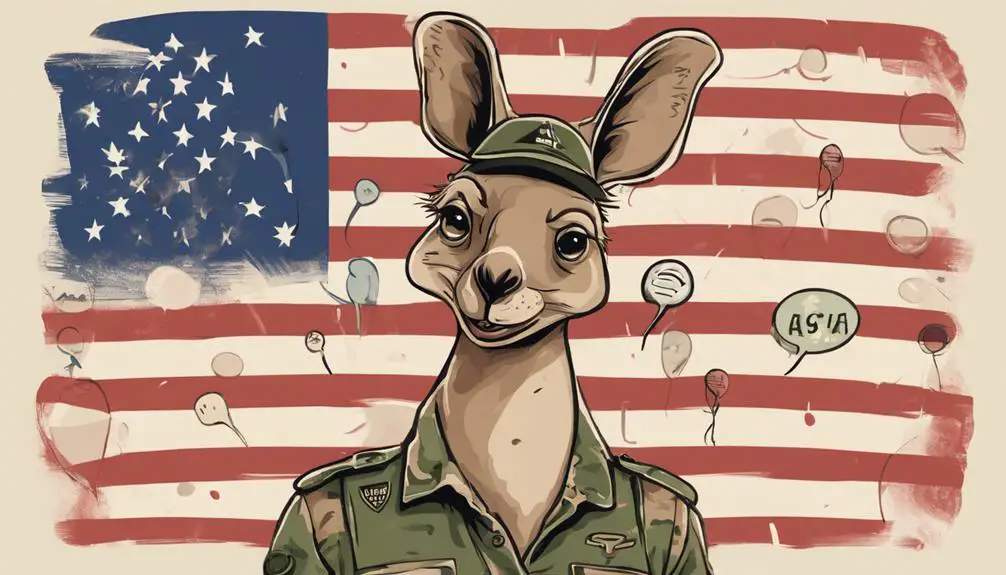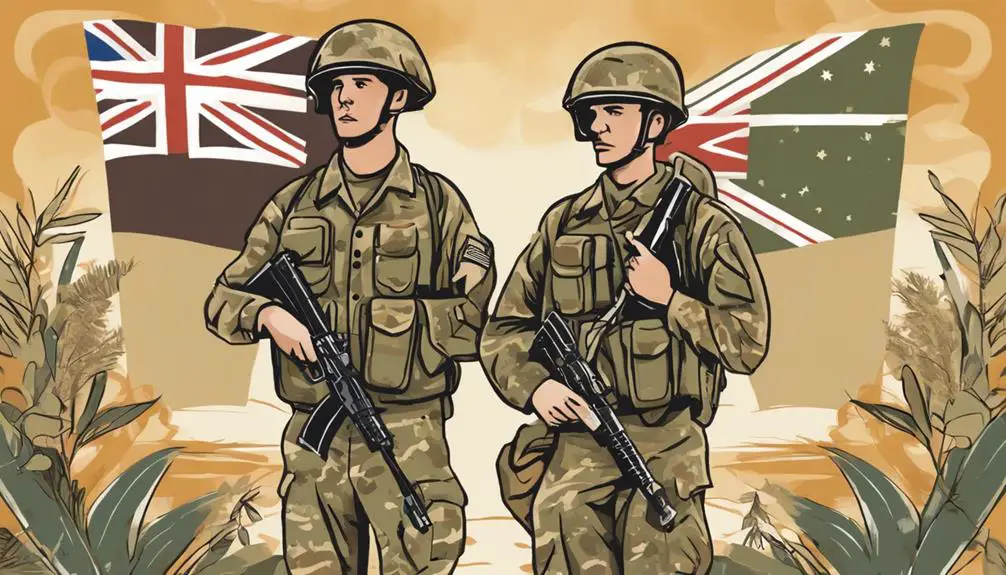When American servicemen arrived in Australia during World War II, they brought a unique linguistic cargo that forever altered the Australian language. You'll find that Aussie slang merged with GI jargon, creating a distinct dialect. Wartime expressions like "cooee" and "chuck a sickie" became common, while American terms like "Yankee Doodle Dandy" boosted morale. As you explore this cultural exchange, you'll discover how Americanisms seeped into Australian vocabulary, transforming everyday communication and vocabulary. The impact on Australian English was lasting, and the story of how this linguistic fusion came to be is one you'll want to further uncover.
Origins of the Slang Phenomenon

During World War II, American servicemen descended upon Australia in droves, bringing with them a linguistic cargo of slang that would forever alter the country's linguistic landscape. As you explore the origins of this slang phenomenon, you'll find that it's rooted in cultural blending and language fusion.
The historical context of World War II created a unique environment where American and Australian cultures merged, resulting in the exchange of language and customs. The etymological roots of this slang can be traced back to the interactions between American servicemen and Australian civilians.
You'll notice that sociolinguistic factors, such as social class, age, and geographical location, played a significant role in shaping the slang. The blending of languages led to the creation of new words, phrases, and expressions that were unique to this period.
As you investigate further, you'll discover that this language fusion wasn't a one-way process, but rather a dynamic exchange that influenced both American and Australian languages. The outcome was a distinct slang that reflected the cultural, social, and historical context of the time.
Aussie Slang Meets GI Jargon
As you explore the intersection of Aussie slang and GI jargon, you'll find that the mingling of these linguistic styles produced a unique dialect that reflected the cultural exchange between American servicemen and Australian civilians.
This cultural fusion led to a fascinating language evolution, as both groups borrowed words and phrases from each other. You'll notice that Aussie slang, known for its colloquialisms and abbreviations, merged with GI jargon, characterized by its technical terms and acronyms. The result was a distinct dialect that facilitated communication between the two groups.
For instance, Australians adopted American military terminology, such as 'GI' and 'jeep,' while American servicemen incorporated Aussie slang, like 'sheila' (a term for a woman) and 'fair dinkum' (meaning 'genuine' or 'true'). This linguistic fusion not only facilitated communication but also symbolized the strong bonds formed between American military personnel and Australian civilians during World War II.
Wartime Expressions and Colloquialisms

Among the hundreds of wartime expressions and colloquialisms that emerged during this period, you'll find terms like 'cooee', which Australians used to hail their American counterparts, and 'chuck a sickie', meaning to call in sick without actually being ill. These colloquialisms not only reflected the cultural exchange between the two nations but also served as a means of communication, often blurring the lines between formal and informal language.
You'll notice that wartime expressions often employed code switching, where speakers would alternate between Australian slang and American English to convey different meanings or to establish a sense of camaraderie. Battle cries, such as 'Yankee Doodle Dandy', were also used to boost morale and create a sense of unity among the troops.
The adoption of these expressions and colloquialisms by both Australians and Americans highlights the unique cultural dynamic that emerged during this period. As you explore the linguistic landscape of this era, you'll discover that these wartime expressions not only reflected the context of the time but also contributed to the development of a distinct linguistic identity.
Americanisms in Australian Vernacular
You'll notice that Americanisms, such as 'cookie' for a sweet biscuit and 'elevator' for a lift, began to seep into Australian vernacular, subtly transforming the local linguistic landscape. This influx of American expressions marked a significant milestone in the linguistic evolution of Australian English. As American servicemen interacted with locals, their colloquialisms and slang terms started to gain traction, paving the way for a unique blend of cultural assimilation.
- Imagine sipping on a 'soda' at the local diner, instead of a 'soft drink'
- Picture a group of friends 'hanging out' at the beach, rather than simply 'socializing'
- Envision a bustling city street with 'elevators' whisking people away to their destinations
- Visualize a group of mates 'taking a hike' through the Australian outback, rather than going for a 'bushwalk'
This cultural exchange not only influenced the way Australians communicated but also reflected the country's growing connection to the global community. As Americanisms continued to permeate the Australian vernacular, the local language underwent a significant transformation, forever changing the fabric of Australian English.
Lasting Impact on Australian English

As you investigate the impact of American military presence on Australian slang, you'll find that the influx of Americanisms into Australian English has led to a lasting impact on the language, with many adopted terms becoming an integral part of everyday conversation.
This cultural assimilation has resulted in a unique blend of languages, with Australians embracing words and phrases that were once foreign to their vocabulary.
The integration of American slang has contributed greatly to the language evolution in Australia. You'll notice that words like 'cool' and 'awesome' have become staples in Australian conversation, replacing traditional Aussie expressions.
This blending of languages hasn't only enriched the Australian vocabulary but has also facilitated communication between Australians and Americans.
As you explore further into the world of Australian slang, you'll discover that the American military's presence has left an indelible mark on the language.
The cultural exchange has been a two-way street, with Australians adopting Americanisms and Americans incorporating Aussie slang into their vocabulary.
This language evolution is a reflection of the power of cultural assimilation, highlighting the dynamic nature of language and its ability to adapt to changing cultural landscapes.
Frequently Asked Questions
Are American Military Slang Terms Still Used in Modern Australia?
You might wonder if remnants of a foreign military presence still linger in everyday language. The answer lies in Australia's cultural fusion.
While American military slang terms aren't dominant, their legacy persists. You'll still hear phrases like 'chuck a sickie' (call in sick) or 'fair dinkum' (genuine).
This cultural blend showcases Australia's military legacy, where foreign influences merged with local dialects. You'll find that Aussie slang is a unique reflection of its history, with American military slang still subtly present in modern Australian language.
Did Australian Women Adopt American Slang During World War Ii?
As you explore the cultural exchange during World War II, you'll discover that Australian women did adopt American slang, especially those who became War Brides. This cultural fusion was a natural result of the close interaction between Australian women and American servicemen stationed in Australia.
You'll find that many Australian women, particularly those who married American soldiers, incorporated American phrases and expressions into their daily language, blending their cultural identities.
Were Australian Aboriginal People Influenced by American Military Slang?
'When in Rome, do as the Romans do' – a fitting adage when exploring cultural exchange.
As you explore the influence of American military slang on Australian Aboriginal people, you'll uncover a complex web of interactions. The language barrier between Indigenous Australians and American servicemen was significant, but the military presence in Australia during WWII created opportunities for cultural exchange.
Within this historical context, it's crucial to examine the impact on Indigenous identity and how it was shaped by these interactions.
Are There Any American Military Slang Terms That Are Considered Offensive?
When exploring slang terms, you'll find that cultural sensitivity is vital. Some terms, though once common, are now considered offensive due to their historical context.
You might come across words that were originally used to demean or stereotype certain groups. It's important to recognize these terms and avoid using them, as they can perpetuate harmful attitudes.
Can American Military Slang Be Seen in Australian Literature and Art?
As you explore Australian literature and art, you'll notice that cultural influences often blend together. Literary reflections of cultural fusion are particularly striking.
You'll find that American military slang has seeped into Australian creative works, reflecting the countries' historical ties. In novels, poems, and films, you'll discover subtle nods to American English, showcasing the dynamic exchange between the two cultures.
Conclusion
As you reflect on the fusion of Aussie slang and GI jargon, consider the wartime expressions and colloquialisms as threads in the rich tapestry of Australian English.
Like a boomerang, American military presence in Australia hurled a linguistic curveball, forever changing the nation's linguistic landscape.
Today, the echoes of 'g'day mate' and 'chow down' resonate through the land, a proof to the lasting impact of this cultural collision.







